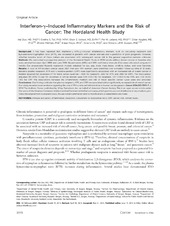| dc.description.abstract | Background It has been reported that interferon-γ (IFN-γ)–induced inflammatory markers, such as circulating neopterin and kynurenine-to-tryptophan ratio (KTR), are increased in patients with cancer and are also a predictor of poor prognosis. However, whether baseline levels of these makers are associated with subsequent cancer risk in the general population remains unknown. Methods We conducted a prospective analysis of the Hordaland Health Study in 6594 adults without known cancer at baseline who were enrolled between April 1998 and June 1999. Hazard ratios (HRs) and 95% confidence intervals (CIs) were calculated using multivariate Cox proportional hazards regression models adjusted for sex, age, body mass index, smoking status, and renal function. Results A total of 971 incident cancer cases (507 men and 464 women) were identified over a median follow-up time of 12 years. Baseline plasma neopterin, KTR and C-reactive protein (CRP) were significantly associated with an increased risk of overall cancer in models adjusted for covariates (P for trend across quartiles = .006 for neopterin, .022 for KTR, and .005 for CRP). The multivariate-adjusted HR (95% CI) per SD increment in similar models were 1.09 (1.03-1.16) for neopterin, 1.07 (1.01-1.14) for KTR, and 1.04 (0.98-1.10) for CRP. The associations between the inflammatory markers and risk of major specific cancer types were also provided. Conclusions Our findings indicate that plasma neopterin, KTR, and CRP are associated with a significantly increased risk of overall cancer. Our study revealed novel evidence regarding the role of IFN-γ–induced inflammation in human carcinogenesis. | en_US |

